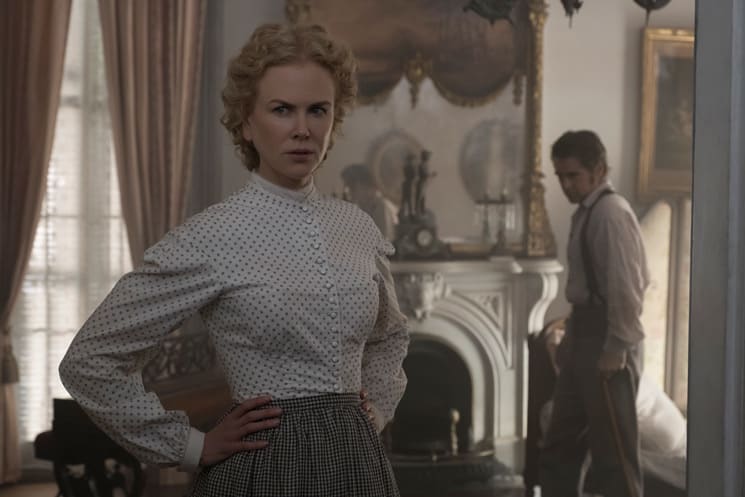It's a rather remarkable feat to have a film directed by a woman, starring seven women (some of whom are award-winning veterans, and some of whom are sure-to-be stars for years to come) and still manage to fail the Bechdel Test, but somehow Sofia Coppola manages to do just that with her remake of The Beguiled.
In fairness, the new movie draws from pre-existing source material, based on Thomas P. Cullinan's 1996 novel (originally titled A Painted Devil, and previously translated to the screen by Don Siegel in 1971), which tells the Civil War-set story of the women at Miss Martha Farnsworth's Seminary for Young Ladies and their encounter with a deserting Yankee soldier.
From the moment a young pupil named Amy (played with perfect innocence by Oona Laurence) discovers Corporal John McBurney (Colin Farrell) in the woods and brings him into the boarding school, tension starts to fester — first between McBurney and the girls, uneasy about the sudden appearance of a mysterious stranger, and then between the girls themselves as they warm to him and viciously vie for his affection (especially memorably when it comes to serving apple pie in one particular standout scene).
But what could have been an exhilarating exploration of female jealousy, repression and desire is marred by an incredibly slow-moving first hour that, despite taking its sweet time, fails to really develop any of the leading female characters beyond their roles as pretty women of varying ages succumbing to the charming wiles of McBurney (most notably Nicole Kidman as the icy headmistress Miss Martha, Kirsten Dunst as the naïve teacher Miss Edwina and Elle Fanning as rebellious eldest student Alicia). It's such that, when the women make sudden professions of love and engage in acts of lust, it seems ludicrous and out-of-nowhere.
Following a dramatic act of perceived betrayal, the film does explode into a grisly, edge-of-seat thriller in its final acts, juxtaposing Coppola's beautiful Southern gothic aesthetic with a splatter of gore, but the somewhat satisfying ending doesn't excuse the tedious, awkward lead-up.
(Universal)In fairness, the new movie draws from pre-existing source material, based on Thomas P. Cullinan's 1996 novel (originally titled A Painted Devil, and previously translated to the screen by Don Siegel in 1971), which tells the Civil War-set story of the women at Miss Martha Farnsworth's Seminary for Young Ladies and their encounter with a deserting Yankee soldier.
From the moment a young pupil named Amy (played with perfect innocence by Oona Laurence) discovers Corporal John McBurney (Colin Farrell) in the woods and brings him into the boarding school, tension starts to fester — first between McBurney and the girls, uneasy about the sudden appearance of a mysterious stranger, and then between the girls themselves as they warm to him and viciously vie for his affection (especially memorably when it comes to serving apple pie in one particular standout scene).
But what could have been an exhilarating exploration of female jealousy, repression and desire is marred by an incredibly slow-moving first hour that, despite taking its sweet time, fails to really develop any of the leading female characters beyond their roles as pretty women of varying ages succumbing to the charming wiles of McBurney (most notably Nicole Kidman as the icy headmistress Miss Martha, Kirsten Dunst as the naïve teacher Miss Edwina and Elle Fanning as rebellious eldest student Alicia). It's such that, when the women make sudden professions of love and engage in acts of lust, it seems ludicrous and out-of-nowhere.
Following a dramatic act of perceived betrayal, the film does explode into a grisly, edge-of-seat thriller in its final acts, juxtaposing Coppola's beautiful Southern gothic aesthetic with a splatter of gore, but the somewhat satisfying ending doesn't excuse the tedious, awkward lead-up.
